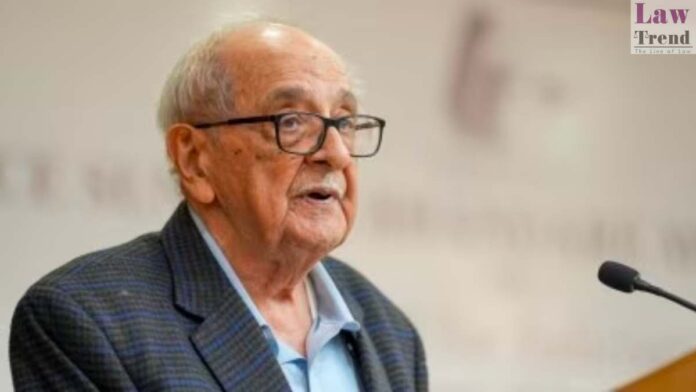India mourns the loss of one of its most distinguished constitutional experts and jurists, Fali S Nariman, who passed away on Wednesday at the age of 95. Nariman’s illustrious career spanned over seven decades, during which he left an indelible mark on the Indian legal landscape through his involvement in several landmark cases.
Nariman’s tenure as the Additional Solicitor General during Indira Gandhi’s administration is particularly noteworthy. He resigned from the position in protest against the imposition of Emergency in 1975, demonstrating his unwavering commitment to democratic values and the rule of law. In his writings, Nariman expressed a deep-seated belief in secularism and wished to breathe his last in a secular India, a testament to his principled stance on justice and equity.
With a career that saw him taking up causes in the Supreme Court for more than 70 years, Nariman was involved in pivotal cases such as the NJAC (National Judicial Appointments Commission) matter, the AOR Association case, and the TMA Pai case, which dealt with the rights of minorities under Article 30 of the Indian Constitution.

Nariman’s influence extended beyond the courtroom. M.L Lahoti, a senior advocate at the Supreme Court with a practice spanning 50 years, regarded Nariman as a mentor. Lahoti’s reflections provide insight into Nariman’s profound impact on the legal community, his advocacy for judicial independence, civil liberties, and secularism. Despite his stature, Nariman was known for his humility, approachability, and a fixed fee structure, making justice accessible to many.
His autobiography, “Before Memory Fades,” is widely read among new lawyers and those interested in the legal profession, offering a glimpse into the life of a jurist who flourished in a secular India and aspired to end his journey in one.
Also Read
Nariman’s departure leaves a void in the constitutional expertise domain, challenging to fill. His journey began at the Bombay High Court in 1950, eventually leading him to the Supreme Court. The Indian government recognized his contributions with the Padma Bhushan in 1991 and the Padma Vibhushan in 2007. He was also nominated as a member of the Rajya Sabha between 1999 and 2005, underlining his significant contributions to the legal and political fabric of India.
Fali S Nariman’s legacy is that of a jurist who not only shaped the contours of Indian jurisprudence but also stood steadfast in his beliefs, advocating for a just and secular society. His passing is a great loss to the nation, but his teachings and principles continue to inspire generations of lawyers and jurists across the country.







